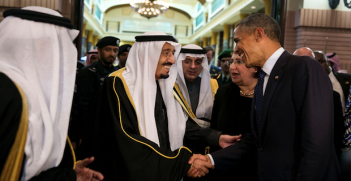Refugees and the European Crisis

For the moment, the European refugee crisis has disappeared off the Australian media’s front pages, except for the odd spike in the tally of people drowned in the Mediterranean. A shaky deal with Turkey seems to be holding, but long-term solutions are as distant as ever and the crisis could flare again from one day to the next.
Why have European countries found it so difficult to come to a joint response? Why the wild swings between welcoming refugees and closing borders? And is the recent hardening of attitudes and policies a sign of domestic concerns over mass migration and even islamophobia?
Key to understanding Europe’s reaction to the rising tide of refugees that moved across the Balkan route in the middle of 2015 is to see the refugee crisis as only one of five major crises confronting Europe. All of these interact, and what began as a humanitarian issue has become a geopolitical challenge to the idea of European integration itself.
Europe has been in a crisis of legitimacy for a long time. Lost referenda on European treaties in the 1990s and the 2000s demonstrate that European integration has long lost much popular support. Right-wing parties in France, Austria and other countries have challenged exhausted political establishments since well before the economic crisis. The Brexit vote is just weeks away and in Eastern Europe nationalist governments in Hungary and Poland rail against liberal Europe. Anti-immigration policies are almost the only element that unifies all these movements but their cause lies in a deep crisis of legitimacy at the European and national level.
The second European crisis is the economic one. Many southern countries have not delivered meaningful growth since the mid 2000s. A lost generation knows little other than social cutbacks and exclusion from the regular workforce. Little wonder that migrants only look to Greece and Italy as waystations to the North — and that both countries have little interest in migrants adding to the mass of unemployed.
In addition, the bailout of Greece was deeply divisive. Southern countries regard Northerners’ insistence on austerity with reference to European rules as deeply damaging, while many Northern critics regard support of Greece as a wilful breaking of the non-bailout clause of the European treaty. The now right-wing Alternative für Deutschland started out as a liberal, anti-Euro party.
This matters because when Merkel opened Germany’s borders in August 2015 she deliberately ignored Europe’s Dublin agreement under which asylum seekers must lodge their applications in the first European country they arrive in. However noble her intentions, Merkel thus reinforced the impression among her critics that European rules are routinely bent to suit political expediency. Once Balkan countries and Austria started closing their borders again, in line with European law, Germany’s position became untenable.
The third crisis is that with Russia. There remains real fear in Eastern Europe about further Russian aggression. By mid 2015 there was a palpable concern amongst senior European officials that NATO was increasingly split between a southern and eastern bloc. Whether or not Russia uses its intervention in Syria to reinforce the refugee crisis by deliberately targeting Syrian civilians (and there are indications that it did) Russia’s blatant attempts to use the refugee issue for subversion and dividing European countries did much in late 2015 to highlight the geopolitical aspects of the crisis. Thousands of refugees suddenly appeared on Norway and Finland’s arctic borders, which Oslo and Helsinki understood as a none-too-subtle coercive signal by Moscow over their support to NATO and Eastern Europe. In Germany, ethnic Russians demonstrated after the Russian media and Foreign Minister Lavrov concocted a story of the rape of an ethnic Russian girl by refugees that was unequivocally debunked by German police. Combined with Russia’s financing of right-wing parties across Europe and several instances of cyber intrusions, Russian subversion has now moved from seemingly paranoid talk to the subject of official investigation by European governments and intelligence services.
Finally, Europe also faces a crisis of Islamist terrorism. Much of that threat is homegrown, as demonstrated by the attacks in Paris and Brussels, but is real and dangerous nonetheless. The implications for the politics of Middle Eastern migration are obvious and not surprising, especially as some of the Paris attackers came to Europe amongst the refugees on the Greek islands— whether genuinely for convenience or to stoke political tensions, no one really knows. European domestic security services were already stretched before the refugees arrived; tens of thousands of soldiers now patrol Europe’s streets in Italy, France, and Belgium; France will mobilize 90,000 security personnel for this years’ European soccer championship; and even Germany had to deploy the armed forces to help manage refugee flows in late 2015. Even so, of the 1.3 million people registered on Germany’s borders in 2015, only 500,000 have so far applied for asylum. What happened to the rest remains unclear as hundreds of thousands have moved on to other countries, found shelter elsewhere or perhaps returned to the Middle East.
Put together, these five crises have taxed the bandwidth and capacity of Europe’s political leadership, foreign affairs and security departments to the limit. Major political, legal and institutional steps to improve Europe’s external borders, such as the transformation of FRONTEX into a genuine European border guard or the creation of a genuine European asylum system, are simply beyond the realm of what is feasible today for governments that are under serious pressure from domestic politics and international events. Even if Europe was not as exhausted as it is, the hope that the West could solve the issues afflicting the Middle East did not survive the 2011 intervention in Libya and the failure of the Arab Spring. With large numbers of refugees coming from Afghanistan, Pakistan and sub-Saharan Africa, reducing migration at its source is also easier said than done.
Muddling through is thus the best that Europe can do, hoping that the agreement with Turkey to take in returned refugees will hold; that naval patrols and supporting the Libyan national government may stabilise that country; and that if need be, Greece can be paid off to become a holding pen for Europe’s refugees with the debt relief that it so desperately needs. The immediate crisis may have abated but the outcome remains uncertain and the stakes huge: both for Europe and for the refugees who are so desperate to seek shelter on its shores.
Stephan Frühling is an Associate Professor in the Strategic and Defence Studies Centre of the Australian National University and is a visiting fellow at the ANU Centre for European Studies. This text is based on his presentation at the AIIA ACT’s 25 May event “From Damascus to Berlin: Europe and the Syria Refugee Crisis”. This article is published under a Creative Commons Licence and may be republished with attribution.





